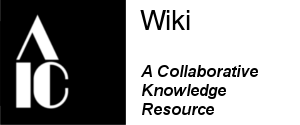Deionized water
Contributions by: Eva Falls
Deionized water is highly purified water that has gone through reverse osmosis and had all of the ionic contaminates removed Garwell 2012.
Related Terms[edit | edit source]
Synonyms in English[edit | edit source]
Translation[edit | edit source]
| English | |
| French | |
| Spanish | |
| Portuguese | |
| Italian | |
| German | |
| Arabic | |
| Chinese (Traditional) | 去離子水 |
Discussion[edit | edit source]
Deionized water is pure water (H2O) meaning it has no charge. Because it does not contain ions, deionized water does not conduct electricity as well as tap water. “What is Deionized Water” 2012 Contaminates with no charge, such as viruses and bacteria, are not removed necessarily in the de-ionizing process unless it is specified by the provider these have been removed. Deionized water can prevent an artifact from reacting with any contaminate ions that might otherwise exist in the water. “What is Deionized Water” 2007 It is often used by conservators in staged baths to remove chlorides from artifacts or for cleaning artifacts. Artifacts should not be stored in deionized water though unless their chloride level is less than that of the local tap water. Often when removing chlorides from artifacts through staged baths, the artifact is first put in tap water and then deionized water. Deionized water should never be used for long term storage for metal artifacts. It is slightly acidic and does not react well with metal and can cause further corrosion. Hamilton 1999
References[edit | edit source]
Garwell, Jerry. 2012. “Deionized Water vs. Distilled Water: What’s the Difference?” Distilled and Deionized Water. [1]. Accessed: 04/22/13.
Hamilton, Donny L. 1999. “Methods for Conserving Archaeological Material from Underwater Sites.” Conservation Research Laboratory. Center for Maritime Archaeology and Conservation: Texas A&M University. [2]. Accessed: 04/22/13.
“What is Deionized Water.” 2012. Pure Tech Industrial Water. [3]. Accessed: 04/22/13.
“What is Deionized Water.” 2007. Department of Physics: University of Illinois at Urbana-Champaign. [4]. Accessed: 04/22/13.
See Also:
Cronyn, J.M. 1990. The Elements of Archaeological Conservation. Routledge: New York
Rickert, David. 1991. “Distilled/Deionized Water for District Operations.” Office of Water Quality Technical Memorandum 92.01. [5]. Accessed: 04/22/13.
